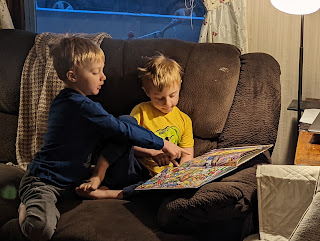Update: I wrote the headline to express a personal point and make a play on "Hello, Dolly," but apparent some readers have been panicking. Sorry. Everyone is fine, honest.)
After five great years, the Board of Directors has aged out of Dolly Parton's Imagination Library.
I have been plugging this program for years (
my first post was in 2014, back before the Board of Directors was even a sparkle in our eyes). Parton has engineered putting a book a month into the hands of families all across the country--we're talking (currently) 184 million books in millions of households meeting no requirement other than they have a child between the ages of born and five. It costs the family nothing.
The quality of the books is great. Over the years we have received classics, newer books, books featuring every sort of family, every sort of kid. They are filled with wonder, kindness, beauty, excitement. This is one of the best examples of thoughtful, useful, not-trying-to-take-over-a-government function philanthropy you'll find.
The program launched in 1995 in Sevier County, and it grew quickly. By 2006,
when the Washington Post wrote about it, the program had spread to 471 communities in 41 states. In 2011
it launched in Scotland, and it can now be found in the UK, Australia, and Canada. The site says that 706,468 US kids are currently signed up. It's still fairly simple. Some combination of sponsors (some private, some government, depending on the locale) help with the financing (the cost is roughly $27 per child per year) and the Foundation delivers the books, each in its own poly bag with the child's name on it (consider the power of a child, even a small one, receiving a book that is theirs, addressed to them, by name).
I am not, I'll confess, a huge fan of Parton's music, but she is the very best example of what good a person can do with their giant pile of money you can find. Not trying to shape the world to her own requirements, not trying to buy a good name, not trying to make herself the unelected boss of whatever. And the little PR that Imagination Library does is to get itself out into the hands of students, not to raise Parton's profile. She doesn't pay people to promote it, and it has spread largely through word of mouth or through the local organizations that co-sponsor it and help make the connections to local families.
Once a month, the boys received a book, addressed to them personally. We love books in this house, and the arrival of the monthly "book from Dolly" was an event. We will miss it.
The last book to arrive is Kindergarten, Here I Come, and the first page inside the front cover is a letter from Parton, that I'll quote in part:
My, how time flies. It seems only yesterday when your family and friends read you your first story. You were just a baby. Now you're five years old and about to go to school. How exciting!
This may be your last book from my Imagination Library but you have to promise me you will keep on reading...Every book is a treasure and every time you open one you will meet new friends and take wonderful journeys to magical places.
I hope you have a great time in school. I bet your school will even have a library where you can check out books. You and all your friends are very special. There is no limit to what you can do or how far you can go.
 |
| The board of directors examines a position paper |
Her signature, a simple Dolly, is at the end. The first time we read the message together I was apparently having a bad allergy day.
None of the rich amateurs who want to change the face of education are doing anything of this value on this scale--both intensely personal and yet broadly across the globe. I mean, imagine if Bill Gates had said, "I want to give every child a book" instead of "I want to give every child a test."
And if there is a tiny human in your life, and they aren't signed up,
go to the program website and see if it's operating in your neighborhood, and if so, then sign up that child.
What a fabulous, generous, powerful program. God bless Dolly Parton. We are going to miss here at this house.



